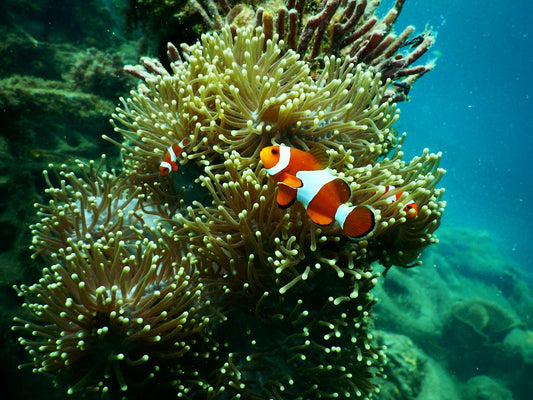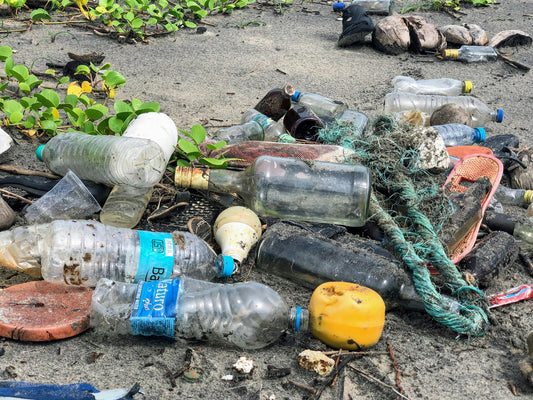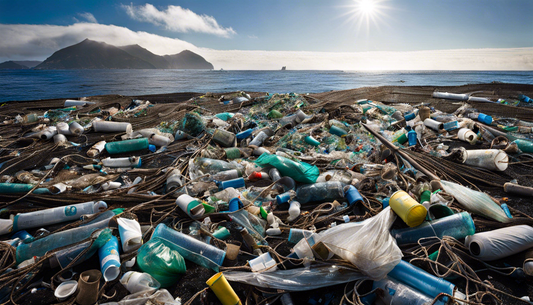Share
Glass has been around for thousands of years. But with the incredible success of plastic, more and more glass products and packages have been replaced by plastic.
As plastic pollution is spreading, glass has recurred as a contender for sustainable products, but it does not come without it's challenges.
WIth growing concern about global warming, plastic pollution, and a healthy lifestyle, it's crucial to figure out the advantages and disadvantages for glass against plastic and find the right balance between both.
This article does exactly that. We'll talk about how both materials affect the environment and our health and will come to a final verdict between the two contestants.
By the end, you'll have a better idea of when glass or plastic is the better choice for you. So, let's explore the world of glass and plastic together!
Let's dive in by checking out the reasons, why glass could be an important material in the fight against the plastic epidemic.
The Resurrection of Glass as Sustainable Material

If you think about the zero waste movement, you'll inadvertently think of condiments nicely arranged in mason jars.
There are very good reasons, why glass has become one of the symbols for a sustainable lifestyle.
- Glass is fully and infinitely recyclable without losing its quality.
- if it does not break, glass can be reused over and over without losing its quality.
- If littered, glass does not leach toxins into the environment.
- Glass production usually does not involve any chemicals, as it is made from melting natural materials like sand, ash, and limestone.
- Glass is known for its food safety, as it does not leach any chemicals or toxins.
- It also does not absorb any colors or flavors, making it an ideal choice for food storage.
- Glass has been used for food storage for centuries, for its great ability to preserve food quality.
- Due to its natural occurrence, its impact on the environment is less severe than plastic. In fact, glass is mainly made of silica, which is a material that naturally makes up a majority of the earth's crust.
- Glass is generally heat resistant and can be used in the oven, dishwasher, and microwave.
Not Everything About Glass is Rainbow and Sunshine

Glass also comes with some disadvantages that cannot be ignored when considering it as a material.
- While it is infinitely recyclable, the true recycling rates vary greatly from 76% across Europe to 31% in the U.S. Contamination or mixed colors in recovered glass can negatively influence the recyclability.
- Glass is heavier and more fragile than plastic, making it less convenient for everyday use.
- While it isn't toxic for the environment glass takes one million years to decompose. Some glass relicts from early Egypt are still perfectly intact.
- Sand is the planet's most mined material. With the growing demand for glass, sand is mined more quickly than it can naturally be replaced, which can damage ecosystems and wildlife.
- Because glass is produced under very high temperatures, glass production emits more greenhouse gases than plastic production.
- New glass is more expensive to produce than plastic, because of its higher melting point.
- Transporting glass is more expensive and emits more carbon than transporting plastic due to the higher weight
Glass vs. Plastic: The Final Verdict
As always, the truth here is not black or white. If glass is more sustainable than plastic depends on different factors.

Glass has great potential to reduce plastic pollution and the demand for plastic in many cases if a few requirements are met.
Reuse Glass Where You Can
Because of its initially higher production footprint, it is more important than ever to reuse glass as often as possible.
Before the invention of plastic and aluminum cans, glass was the primary material used for most food and drink packaging. And we did it sustainably!
For decades we drank our beer, soda, and milk from refillable glass containers that were refilled dozens of times before being thrown out.
That's where the real advantage of glass comes in because it can be reused over and over without leaching toxins or losing quality.
Whenever you buy glass containers, think about how you could reuse them before tossing them out.
There are many creative ways you can reuse glass containers that span from storing leftovers, to buying in bulk, to repurposing containers for beautiful candles, flower pots and many more.
Recycle What You Must
Once your kitchen cabinet is full of mason jars and glass bottles, you may have to toss out glass containers.
If that's the case, make sure that you recycle your glass containers properly.
- Rinse and clean the containers and make sure they are free of residue from food or the label
- Remove aluminum or plastic lids before recycling
- Be careful when tossing it into the recycling bin to avoid breaking the container
- Make sure the type of glass can be recycled by checking your local recycling guide, as some glass may not be accepted (e.g. windows)
Reduce Your Consumption in the First Place
Glass cannot solve our pollution problem, if we continue overconsumption.
As we are working towards a circular economy, glass has already proven its merits in the past.
BUT reducing the consumption of single-use materials needs to be the starting point. Wheter it is glass, plastic, aluminum or paper, only if we all consume less and produce less waste in the first place, reuse schemes and recycling can be effective.
We hope you enjoyed this article. If you want to read more like this, make sure to check out our Blog and follow us on Instagram. If you are interested in truly sustainable products, check out our Shop.
If you want to engage in the discussion, feel free to leave a comment below.








